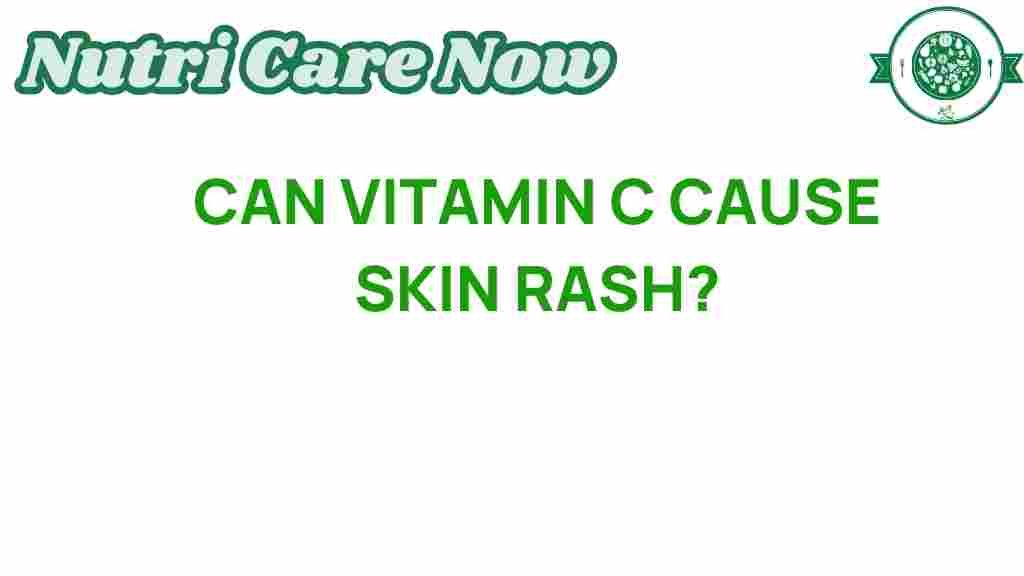Can Vitamin C Cause Skin Rash? Unpacking the Controversy
Vitamin C is heralded as one of the most vital nutrients for skin health, known for its antioxidant properties and ability to promote collagen production. However, a growing number of individuals have reported experiencing a skin rash after using vitamin C products or supplements. This has sparked discussions in the fields of dermatology and skincare about the potential for allergies and adverse reactions. In this article, we will explore the relationship between vitamin C and skin rashes, examining the health risks, possible reactions, and how to safely incorporate this essential nutrient into your skincare routine.
Understanding Vitamin C and Its Role in Skincare
Vitamin C, also known as ascorbic acid, is a water-soluble vitamin that plays a crucial role in various bodily functions, including:
- Boosting the immune system
- Promoting wound healing
- Acting as a potent antioxidant
- Enhancing skin luminosity and texture
In skincare, vitamin C is widely used in serums, creams, and supplements, often marketed for its ability to brighten skin, reduce signs of aging, and improve hyperpigmentation. However, with its increased popularity, the incidence of skin reactions, including skin rash, has also risen.
Can Vitamin C Cause Skin Rash?
The short answer is yes, vitamin C can cause a skin rash in some individuals, but the reasons can vary significantly. Here are some of the primary factors that contribute to skin reactions:
- Allergies: Some people may have a sensitivity or allergy to vitamin C or its formulations.
- Concentration: High concentrations of vitamin C can irritate sensitive skin.
- pH Levels: The pH of the product can affect how the skin reacts. Formulations that are too acidic may cause irritation.
- Other Ingredients: Skin rash can sometimes be attributed to other components in the product rather than vitamin C itself.
Types of Reactions to Vitamin C
Reactions to vitamin C can manifest in various forms, including:
- Contact Dermatitis: A red, itchy rash that may develop after applying vitamin C topically.
- Urticaria: Hives or welts that can appear suddenly and are often itchy.
- Acneiform Eruptions: Breakouts that resemble acne can occur, particularly with certain formulations.
Identifying Allergies and Reactions
Recognizing the signs of an allergy or adverse reaction is vital for anyone using vitamin C in their skincare routine. Here are steps to identify if your skin rash is related to vitamin C:
- Stop Using the Product: Cease application immediately if you notice any redness, itching, or swelling.
- Observe Symptoms: Note if symptoms improve after discontinuation of the product.
- Patch Test: Before trying a new vitamin C product, perform a patch test on a small area of skin.
If the rash persists, consult a dermatologist for a thorough evaluation.
How to Safely Use Vitamin C
While vitamin C can cause allergic reactions for some, it remains a beneficial nutrient for skincare when used correctly. Here are tips for safely incorporating vitamin C into your regimen:
- Start Slowly: Begin with a lower concentration product to see how your skin reacts.
- Choose the Right Formulation: Look for products with stable forms of vitamin C, such as ascorbic acid or sodium ascorbyl phosphate.
- Layer Wisely: Avoid mixing with other potent actives like retinol or AHAs to reduce irritation.
- Consult a Professional: If unsure, seek advice from a dermatologist or skincare specialist.
Potential Health Risks Associated with Vitamin C
While vitamin C is generally considered safe, there are some health risks to be aware of, especially when taking supplements. These include:
- Gastrointestinal Issues: High doses can cause stomach upset, diarrhea, and nausea.
- Kidney Stones: Excessive vitamin C can increase the risk of developing kidney stones in susceptible individuals.
- Allergic Reactions: As previously mentioned, some may experience allergic reactions that require medical attention.
Consulting with a Dermatologist
If you suspect that vitamin C is causing a skin rash, or if you’re experiencing troubling reactions, it’s essential to consult a dermatologist. They can provide:
- A thorough examination of your skin
- Allergy testing if necessary
- Recommendations for alternative products or treatments
For more comprehensive information about vitamin C and its effects on the skin, visit the American Academy of Dermatology.
Internal Link to Related Topics
To learn more about the ingredients in your skincare routine, check out our article on understanding skincare labels.
Conclusion
Vitamin C is a powerful nutrient that offers numerous benefits for skin health, but it can also cause reactions such as skin rash in some individuals. By understanding the potential for allergies and taking appropriate precautions, you can safely enjoy the advantages of vitamin C in your skincare routine. Always remember to consult with a skincare professional if you experience any adverse reactions, and prioritize your skin’s health and well-being above all.
In summary, while vitamin C is a fantastic addition to your skincare arsenal, being aware of the possible health risks and how to manage them is essential for achieving the best results without compromising your skin’s health.
This article is in the category Health and created by NutriCareNow Team
